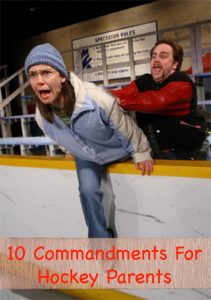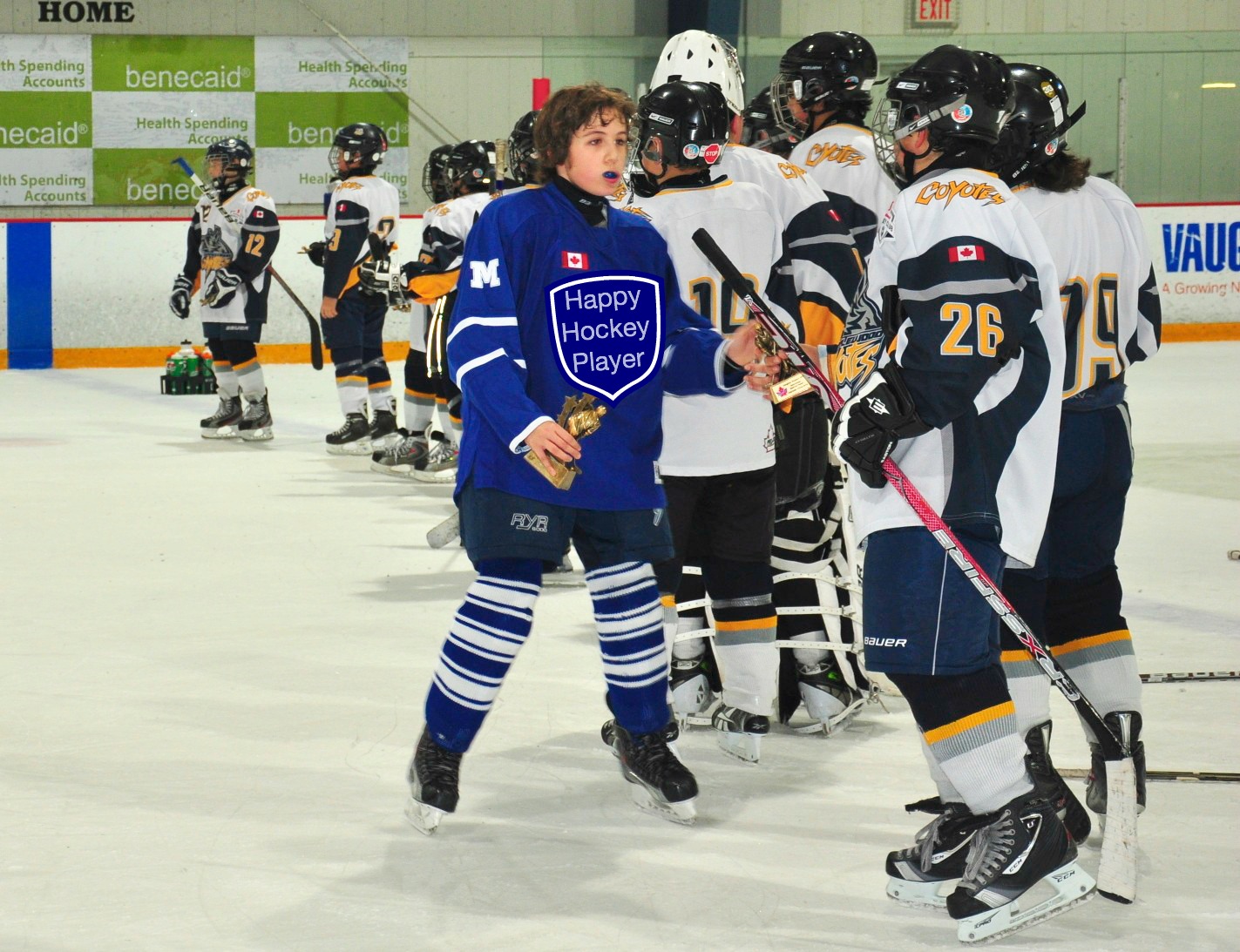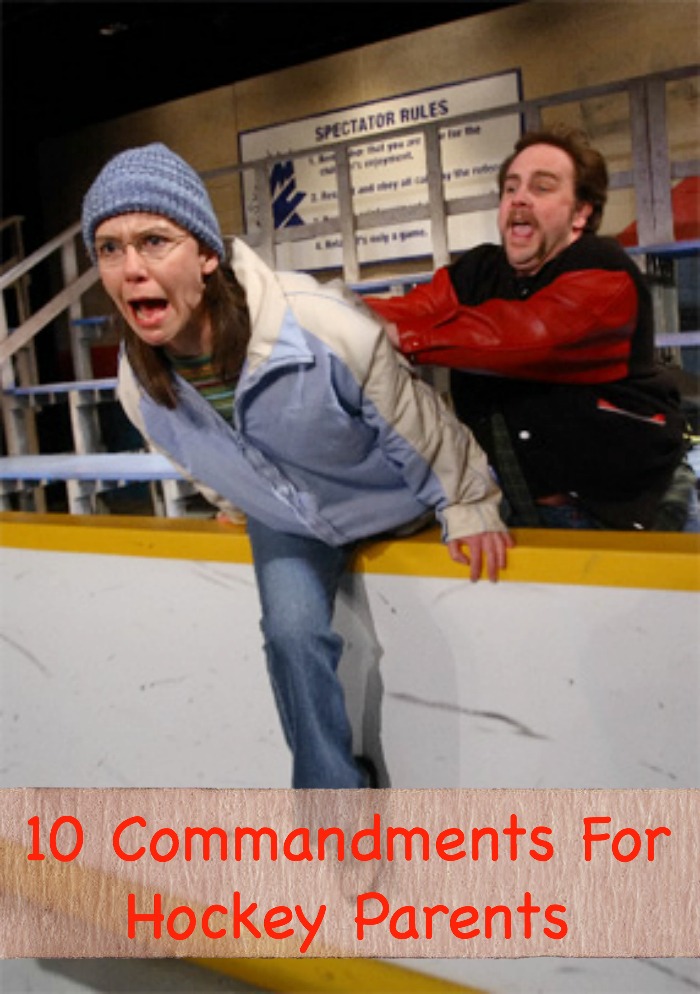The back to school flurry and the reddening leaves mean one thing: hockey season is approaching.
It actually means many things are approaching, like winter and clearing snowy driveways and nostrils that stick together and dammit where is that second mitten? For many Canadians and Americans whose second home is the rink, winter equals hockey. Every year the equipment is pulled out, tried on, exchanged, skates are laced up, old teammates renew friendships or become rivals, and excitement buzzes as kids step back onto the ice. And every year there’s at least one jackass whose behaviour makes it necessary to defend both the game we love and the reason we’re proud to be hockey parents.
The term jackass doesn’t discriminate against sex, as both women and men can wear the name with shame. I am a hockey mom sans the jackass label even if I’ve made mistakes over the years. The majority of us are, and we’re there to cheer and pace and laugh and cry and generally support each other unless our kids are intentionally hurt and then we’re shooting imaginary flames at your head. That last part is my superpower, but since all moms are part protective dragon, I can safely apply it across the board.
To avoid being labelled a jackass — because you will be if you act like one — and to clarify what the job of a hockey parent is (especially if you’re new to the rink) I’ve laid it out as a simple to remember list of ten commandments for hockey parents:
The Ten Commandments For Hockey Parents
You are the moneyman.
Basically you write the cheque and then step back, unless you’re also a volunteer and then you write the cheque and take on an unpaid part-time job for 8-9 months.
You will have your child at the rink on time with his or her complete equipment.
Teams have guidelines and coaches will place expectations on parents and players, and one of those is to respect the schedule. If the coach asks players to arrive one hour before the game, don’t stroll in 20 minutes before the puck drops.
Hockey is as much what happens in the dressing room as the game that’s played on the ice. Remember to bring every piece of equipment. No jock? No game. You want grandchildren one day, right? When players are young parents can pack the hockey bags with them, but once kids are old enough to haul that bag themselves they need to pack it, too. Which brings me to the bag; stop carrying your kid’s hockey bag, especially if they are already shaving. Hockey players carry their own equipment past a certain age; it’s a matter of pride.
You will cheer — not yell — at the team.
Do I need to explain this? Be supportive and don’t be mean. There’s a distinction between cheerleader and angry-faced buffoon. Instant jackass status applied upon first shout of negativity.
You will help out where and when needed.
Volunteers run hockey in Canada and if no one volunteers? NO HOCKEY. Not everyone can or should be a coach, but ask if you can be a timekeeper or parent liaison or general gopher. The coaches will appreciate it and it’s a good example for our children.
You are not the coach.
That’s why you’re sitting in the stands and not in the change room where it can get ugly; teen hockey player scent is as ripe as a combo of rotting onion, garlic, and goat. Save your criticism for how practices are run, the length of the shifts, and player line-ups. Coaches spend more time planning, reviewing, instructing, guiding, and thinking about practices and games late into the evening than many parents spend sleeping. Time coaching — a lot of which happens off the ice — is time spent away from their families, and coaches are volunteers. They are doing their best, unless they’re being jackasses themselves with no regard for the physical and mental well-being of the players and then criticize away. But let’s not confuse coaching, which comes with correction and discipline, with being mean to little Suzy.
You will not shout at the referees.
These are your neighbours or your neighbours’ kids. The only things shouting at refs will earn you are head-shakes from other parents, potentially being kicked out of the rink, and an embarrassed child.
You will not yell at the other team.
They are kids; children who ride their bikes through the neighbourhood, chase down the ice cream truck, and learn their multiplication tables at the dining room table. How would you feel if another adult yelled at your child? Steaming, right?
You will not embarrass your child with your behaviour.
Our children want our love and admiration and not to be the kid whose parent is the butt of dressing room jokes. Look, when we signed on to being a parent we waived our rights to pick our nose in public or get into brawls, so model the behaviour you expect from your child.
You will remember that the kids on the ice are playing their hearts out for a game they love.
You are not Ron MacLean and this isn’t Hockey Night In Canada; nobody needs to hear your play-by-play analysis of everything that went wrong with the game. The players especially don’t need to hear it. They love hockey, so follow a common sense code of conduct and don’t suck the fun out of it.
You will welcome new parents.
Cliques belong in high school along with stirrup pants, frosted lip-gloss, and binders covered in doodled hearts proclaiming your undying love for Jimmy Harrison. You’re an adult who functions in society so be kind and welcome new parents to the hockey society.
Now go forth and cheer! See you at the rink.

Image Source: Canadian Theatre Encyclopedia




 Quick and Easy Hot Apple Cider
Quick and Easy Hot Apple Cider
Leslie
Great post Katja. Applies to any team sport really … sans the ice!
Alison Pentland
Great article! All three kids played, including my daughter, and my husband plays with several teams he loves it so much. Rick would add: Don’t go into the dressing room or tie your kids skates past a certain age. If you are not sure just ask one of the coaches if your help is required, if not grab a hot cup of cocoa, tuck your blanket around your knees and enjoy the game.
Louise
CLIQUES BELONG IN HIGH SCHOOL – YES!! And I agree. This belongs to many group activities.
Katja
Perfect! Add the dressing room and skates as commandment eleven. Glad you enjoyed it.
Katja
Exactly, change skates for cleats or pointe shoes and you can apply it everywhere. Thank you.
Katja
It does. And seriously what’s with the cliques?!
natalie
Love this – I was a ringette mom for 9 years. You wouldn’t believe the types of parents I encountered. I was lucky on my team, in all my years only a few parents who naysayed the coaches and yelled at refs. Thankfully no yelling at the players.
That said, I know I embarrassed my kid terribly one time when I yelled out, “Are you okay??” after she had been escorted off the ice subsequent to a hard hit. But she had previously suffered a dislocated knee, dislocated shoulder (that required surgery), whiplash and a concussion that had her out of school for a month, so I was perhaps still “raw” from all that. I learned my lesson when all the teenagers in the stands cringed, thankful I wasn’t their parent 🙂
Pam
Amen to this. As a retired (way too geriatric) hockey parent, I will be cheering loudly and appropriately at the rink anyway this year. Since it took me 14 years to finally master all those commandments, it’s time to get em out and get em working … er …. : D
Katja
We’ve all embarrassed our own kid at one point; yelling, “Go, hon,” when the rink was silent didn’t go over well. 😉
Katja
Thanks, Pam. I’m still tweaking a few points, especially point 7.
fosterbrooks
There are plenty of them – especially with a few parents who kids have been on the team awhile – or the ‘team mom’ and her crew who keep the clique up and are very unwelcoming of new people – even the kids notice – some people never get over their high school days.
Jo
I would add “Cheer for the WHOLE team, not just your kid.” It irritates me when a particular mom cheers on just her son. I have never heard her once all season cheer for the whole team. Sometimes, if she yells “Go, Jr!”, I will yell “Go team!” (Leaving the names out to protect the innocent. Haha)
SportsPOP
Enjoyed the post, same rules apply to all sports. Hope to link back to it from a future post!